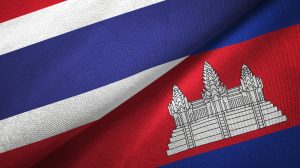Thailand has again accused the Cambodian military of laying fresh landmines along the two countries’ shared border, drawing another angry denial from Phnom Penh.
The Royal Thai Army (RTA) claimed that three Thai soldiers were injured by a landmine while patrolling an area between Thailand’s Sisaket province and Cambodia’s Preah Vihear province on Saturday. One soldier lost a foot and the other two were injured in the explosion. RTA spokesperson Maj. Gen. Winthai Suwaree claimed that the area had previously been cleared by the Thai humanitarian mine action unit, accusing Cambodia of deliberately laying the mines, adding that the act was “dishonorable, lacks the dignity of a soldier, and constitutes a deliberate violation of the Ottawa Convention.”
In a statement, the Cambodian Mine Action and Victim Assistance Authority denied the Thai army’s accusation.
“Cambodia’s position is unequivocal: We have not, and will not, plant new landmines,” it stated. “Cambodia is a proud State Party to the Anti-Personnel Mine Ban Convention [the Ottawa Convention], which it ratified in 1999, and has an internationally recognized record of removing, not deploying, these indiscriminate weapons.” A similar denial was also issued by the country’s Ministry of Foreign Affairs.
The blast came just two days after the two nations’ General Border Committee agreed to a 13-point plan to maintain the ceasefire that was declared on July 28, after five days of fierce clashes along the border, which killed at least 43 people and displaced more than 300,000 on both sides of the border. This involved a mutual pledge to freeze border troop movements and patrols, not to reinforce their positions along the border, and “not to undertake provocative actions that may escalate tensions.”
The blast followed two similar landmine explosions reported by the Thai military, which contributed to the outbreak of hostilities last month. The first took place on July 16 in the eastern sector of the border, when three Thai soldiers were wounded after one stepped on a landmine and lost a foot, after which the Thai army said that it had found that 10 freshly laid Russian-made PMN-2 anti-personnel mines in areas along the border, the same type that the Thai army alleges was involved in Saturday’s explosion.
A second blast on July 23, which injured five soldiers, one of whom lost his right leg, prompted Thailand to downgrade its diplomatic relations with Cambodia, a move that precipitated the outbreak of fighting on July 24. On both occasions, Cambodia denied laying fresh mines, arguing that the Thai soldiers had strayed from previously agreed patrol routes and stumbled across landmines that were laid during the country’s long civil war in the 1980s and 1990s.
The exchange of angry statements hints at the level of mistrust and tension that persists between the two sides, despite last week’s ceasefire agreement. Politicians and military officials on both sides continue to engage in tit-for-tat statements and accusations that continue to raise the prospect of a resumption of fighting.
In comments to the press yesterday, Lt. Gen. Boonsin Padklang, the head of Thailand’s Second Army Region, vowed to recapture Prasat Ta Kwai (Prasat Ta Krabei in Khmer), one of three temples that are at the center of the current dispute. He added that the Thai army had now closed Ta Moan Thom, another of these temples, “and are considering whether to permanently close it or close it only for certain periods.” He also made the unverified claim that Cambodia had suffered 3,000 casualties in the recent border clashes.
Cambodian Defense Ministry spokesperson Maly Socheata wasted no time in denouncing the Thai declaration as “irrefutable evidence of provocation and a deliberate and premeditated attempt to invade Cambodian territory.” She said that Boonsin’s comments violated the July 28 ceasefire and “undermined the spirit of the Cambodia–Thailand General Border Committee’s extraordinary meeting in Malaysia on August 7.”
Exactly which side is most responsible for the continued tensions is hard to determine. Nonetheless, it is clear that political dynamics on both sides of the border continue to militate against a peaceful solution, and that the nationalist passions stoked by the recent conflict make it hard for either nation to be perceived as “giving in” to the other, or allowing a perceived slight to go unanswered.
On the Thai side, tensions persist between the weak Pheu Thai-led government, which signed the ceasefire agreements on July 28 and August 7, and the Thai military, which has long viewed itself as the ultimate guardian of Thai sovereignty. As Paul Chambers noted in a recent article for Fulcrum, the lead-up to last month’s conflict saw the military repeatedly undermine the authority of the Pheu Thai government, which the army and the conservative Thai political establishment, more generally, have long mistrusted. The resulting disjuncture has introduced an unpredictability and volatility into Thai decision-making on the border dispute that has increased the chances of a fresh outbreak of fighting.
Unlike its counterpart in Bangkok, Prime Minister Hun Manet’s government continues to benefit politically from the border conflict, which has unified the nation around his leadership. Given its control of the military and the press, it has also been able to establish more messaging discipline than the Thai side. This suggests that the government’s acrimonious claims about Thai behavior, which have included a number of outlandish false claims, are a conscious strategy to play on Thai internal divisions.
Whether or not the Cambodian government actively wishes to stoke the conflict, the sense of le patrie en danger clearly comes with ancillary benefits, creating a distraction from more pressing social and economic challenges. As with the Thai side, it currently has more to gain from confrontation than from a lasting peace.
































